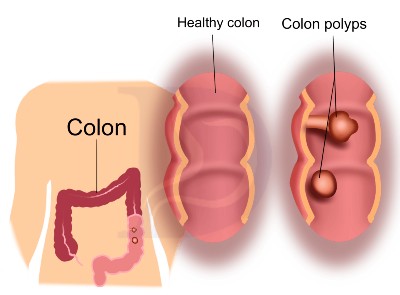Colorectal Cancer Screening: It's Easier Than You Think
Are you Age 45 or older?
This is the recommended age to begin colorectal cancer screening.1 Regular testing can help find cancer early. It may be easier to treat when caught early. Risk for getting colon cancer (large intestinal cancer) can go up due to family history, diet, lifestyle, age, ethnicity and gender.
- Pruebas de detección del cáncer colorrectal – En Español (Spanish)
- 結腸直腸癌篩檢 – 華語 Chinese (Traditional)
- Screening para sa Colorectal Cancer – Tagalog
Colorectal cancer screening can save lives! Screening kits are available to test from the comfort of your home. The home screening kits are easier and simpler to use than you may think. Talk to your doctor today about which at-home screening option is best for you.

Here’s what to do next:
- Don't delay! If you have already received a referral from your doctor, call and schedule your appointment today! For help scheduling a doctor’s visit, call Member Services at the phone number on the back of your member ID card.
- If your doctor gives you an at-home screening kit, complete it this week!
- If you’re not sure if you're due for a screening, talk to your doctor as soon as possible. Your doctor will also be able to tell you which screening option is best for you.
Why is colorectal cancer screening important?
In the United States, cancer is the 2nd leading cause of death behind heart disease.2 Looking at the types of cancer, colorectal cancer is also the 4th leading cause of cancer death.3
| Race / Ethnicity | Colorectal Cancer Leading Cause of Death |
|---|---|
| White, non-Hispanic people | 4th |
| Black, non-Hispanic people | 4th |
| American Indian and Alaska Native non-Hispanic people | 3rd |
| Asian non-Hispanic people | 3rd |
| Hispanic people | 4th |
But the good news is screening can help find cancer early. It may be easier to treat when caught early.
Screening tests for colorectal cancer can help! Preventive screenings like colorectal cancer screening are important to do, even when you feel well.
- People at average risk for getting colon cancer start screening at age 45.
- Many people have polyps or cancer and don’t have any symptoms.
- Completing a screening test will help find polyps and cancer earlier.

What is a Polyp?
Sometimes abnormal growths, called polyps, form in the colon or rectum. Most polyps are harmless. But some polyps may turn into cancer. Screening tests can find polyps so they can be removed before turning into cancer. Screening also helps find colorectal cancer at an early stage when treatment works best.
What types of screenings are available?
Screening options include stool sample screening tests and visual screening tests. Some screening tests you can do from the comfort of your home. Other screenings are done by a doctor. If you have a family history of colorectal cancer, talk to your doctor about what option is best for you.
These are stool sample screening tests that you can do from your home.4,5,6 You can choose the stool sample test that works best for you.
| Stool Sample Test Name and Process | How Often to Take the Test | Next Steps |
|---|---|---|
| Guaiac Fecal Occult Blood Test (gFOBT) uses the chemical guaiac to detect blood in the stool. For this test, you receive a test kit from your health care provider. At home, you use a stick or brush to obtain a small amount of stool. You return the test kit to the doctor or a lab, where the stool samples are checked for the presence of blood. | Every year | The results will be shared with you and your provider. |
| Fecal Immunochemical Test (FIT or iFBOT) uses antibodies to detect blood in the stool. Like the gFOBT, you receive a test kit from your health care provider. At home, you use a stick or brush to obtain a small amount of stool. You return the test kit to the doctor or a lab, where the stool samples are checked for the presence of blood. | Every year | The results will be shared with you and your provider. |
| Cologuard Screening Kit also referred to as the stool DNA test. It combines the FIT test with a test that detects altered DNA in the stool. For this test, you collect a bowel movement in a container and send the container with a scraping of the stool to the lab. The lab checks it for altered DNA and for the presence of blood. | Every 3 years | You will receive your test results. Next steps will be shared with you. |
These visual tests4,5 are completed in-person by a doctor.
| Visual Test Name and Process | How Often to Take the Test | Next Steps |
|---|---|---|
| Colonoscopy is a screening test that looks for changes in your colon and rectum. The doctor inserts a long, thin, flexible tube with a light and camera to detect possible polyps or cancer. The doctor can remove polyps during this test to help prevent cancer before it starts. The screening is done every 5-10 years based on what the test finds. | Every 5-10 years | The doctor will schedule an appointment with you to review the results and offer recommendations. |
| CT (Virtual) Colonography is a scan to produce images of your colon. If your test result is positive or abnormal you may still need a colonoscopy. | Every 5 years | The doctor will schedule an appointment with you to review the results and offer recommendations. |
| Sigmoidoscopy is a screening test that uses a long, thin, flexible tube with a camera to view the lower part of your colon. It is done every 5 years. But if you complete a FIT test every year (described in Stool Sample Tests table) a sigmoidoscopy can be done every 10 years. If your test result is positive or abnormal you may still need a colonoscopy. This test is not often used as a screening tool for colorectal cancer in the U.S. as the doctor can only view half of your colon. | Two options:
| The doctor will schedule an appointment with you to review the results and offer recommendations |
The Tough Conversations
Talking to your friends and family about getting a colorectal cancer screening test may not be an easy conversation. But it is important in keeping you and your family healthy! It can also give you, family, and friends support to get screenings done.
This table shares some ways to talk about colorectal screening. It can help prepare you to talk with your doctor, family and friends.
| Concern | Discussion |
|---|---|
| We don't talk about this topic. | A lot of people feel uncomfortable talking about colorectal screening. That's okay. It can feel like something that we should not talk about. |
| I don't know my family's history of colon cancer. | Asking about your family history of colon cancer helps others in your family know their history. Ask the tough questions. Your questions can help others learn. They may decide to get screened. Start or build on your family history by getting screened. Getting tested regularly can help find any cancer early. It may be easier to treat when caught early. If you are 45 or older, ask your doctor if you are due for a colon cancer screening. |
| I've never done a home test and am uncomfortable doing it. | The home tests are easier than you may expect and don't have to be messy. Here is one suggestion: To help with cleanliness, bring a TV tray or chair next to the toilet. Place sheets of clean paper towels or wax paper on the surface. Place your test kit on this clean surface within easy reach. Follow the instructions to gather your stool sample. Carefully pack up your sample for mailing. Set it aside. Then gather up the paper and throw it away. Wash your hands well. |
| I'm not sure I'm doing the home test the right way. | A home kit has step-by-step instructions on what to do. It includes all the items you will need to collect your sample and finish the test. There is also a phone number on the kit to call with questions. Once you complete your test, you will mail your sample to the lab. The kit has a postage pre-paid envelope. |
| I feel fine. I don't think I need to complete a colorectal screening test. | Most people with colon polyps do not have any symptoms. But someone could have polyps or colorectal cancer and not know it.6 Getting tested regularly can help find any cancer early — when it may be easier to treat. |
Do you know how to prevent colorectal cancer?
Take this quick quiz to check how much you know!
Colorectal Cancer Quiz
More Information about Colorectal Cancer Screening Options
gFOBT Resources
- Colorectal Cancer Alliance, "Guaiac fecal occult blood test" fact sheet. Retrieved from Colorectal Cancer Alliance: https://www.ccalliance.org/screening-prevention/screening-methods/guaiac-fecal-occult-blood-test
- National Library of Medicine (NIH), "Fecal Occult Blood Test (FOBT)" fact sheet. Retrieved from MedlinePlus: https://medlineplus.gov/lab-tests/fecal-occult-blood-test-fobt/
FIT Resources
- Colorectal Cancer Alliance, "Fecal immunochemical test" fact sheet. Retrieved from Colorectal Cancer Alliance: https://www.ccalliance.org/screening-prevention/screening-methods/fecal-immunochemical-test
- National Library of Medicine (NIH), "Fecal immunochemical test (FIT)" fact sheet. Retrieved from MedlinePlus: https://medlineplus.gov/ency/patientinstructions/000704.htm
Cologuard Resource
- Healthline, "Everything You Need to Know About Cologuard for Cancer Screening" fact sheet. Retrieved from Healthline: https://www.healthline.com/health/cologuard
Colonoscopy Resources
- National Institute of Health, "Colonoscopy" fact sheet. Retrieved from the National Institute of Diabetes and Digestive and Kidney Diseases: https://www.niddk.nih.gov/health-information/diagnostic-tests/colonoscopy
- American Cancer Society, "Colonoscopy" fact sheet. Retrieved from the American Cancer Society: https://www.cancer.org/cancer/diagnosis-staging/tests/endoscopy/colonoscopy.html
CT (Virtual) Colonoscopy Resources
- National Institute of Health, "Virtual Colonoscopy" fact sheet. Retrieved from the National Institute of Diabetes and Digestive and Kidney Diseases: https://www.niddk.nih.gov/health-information/diagnostic-tests/virtual-colonoscopy
- WebMD, "What is a ‘Virtual’ Colonoscopy? Fact sheet. Retrieved from WebMD: https://www.webmd.com/colorectal-cancer/virtual-colonoscopy
Sigmoidoscopy Resources
- National Institute of Health, "Flexible Sigmoidoscopy" fact sheet. Retrieved from the National Institute of Diabetes and Digestive and Kidney Diseases: https://www.niddk.nih.gov/health-information/diagnostic-tests/flexible-sigmoidoscopy
- WebMD, "What is a Flexible Sigmoidoscopy? Fact sheet. Retrieved from WebMD: https://www.webmd.com/colorectal-cancer/flexible-sigmoidoscopy
General Information about Colorectal Cancer Screening Test options
- American Cancer Society, "Colorectal Cancer Screening Tests" information sheet. Retrieved from American Cancer Society: https://www.cancer.org/cancer/types/colon-rectal-cancer/detection-diagnosis-staging/screening-tests-used.html
- Centers for Disease Control and Prevention, "Colorectal Cancer Screening Tests" information sheet. Retrieved from the Centers for Disease Control and Prevention: https://www.cdc.gov/cancer/colorectal/basic_info/screening/tests.htm
Article Sources
1 Center for Disease Control and Prevention. Screening for Colorectal Cancer | Colorectal Cancer | CDC
2 United States Cancer Statistics: Data Visualizations. Retrieved from Center for Disease Control and Prevention
3 Centers for Disease Control and Prevention. (2024, February 17). Colorectal Cancer.
4 US Preventive Services Task Force. (2021, May 18). Colorectal Cancer Screening. Retrieved from US Preventive Services Task Force: https://www.uspreventiveservicestaskforce.org/uspstf/recommendation/colorectal-cancer-screening#tab2
5 US Preventive Services Task Force. (2021, May 18). Colorectal Cancer Screening. Retrieved from US Preventive Services Task Force: https://www.uspreventiveservicestaskforce.org/uspstf/recommendation/colorectal-cancer-screening#tab1
6 Centers for Disease Control and Prevention. (2023). What are the symptoms of colorectal cancer? Retrieved from Centers for Disease Control and Prevention: https://www.cdc.gov/cancer/colorectal/basic_info/symptoms.htm
